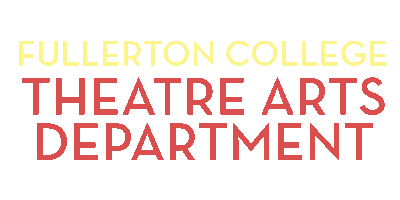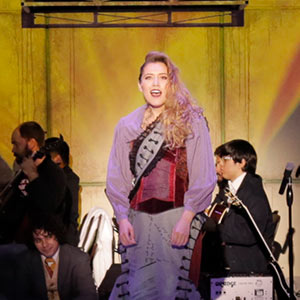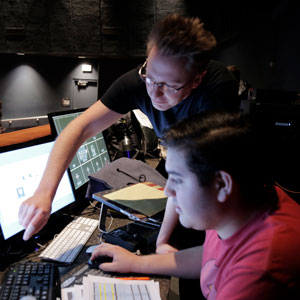Theatre Arts Associate in Arts Degree for Transfer
PROGRAM CODE: 2A31648
The Associate in Arts Degree in Theater Arts for Transfer, also called the Theater Arts AA-T Degree, prepares students to transfer to CSU campuses that offer bachelor's degrees in Theater Arts. Ed Code Section 66746-66749 states that students earning the Theater Arts AA-T Degree will be granted priority for admission as a Theater major to a local CSU, as determined by the CSU campus to which the student applies. This degree requires students complete 60 CSU transferable units including completion of CSU GE or IGETC and 18 units in the major with a cumulative GPA of 2.0 or better. Title 5 requires that students earn a grade of "C" or better in all major coursework. This degree provides students with an understanding and an appreciation for the art of theater and includes courses in acting, technical theater, rehearsal and performance as well as an introduction to the theater and play analysis. Completion of this curriculum will provide preparation for future theater studies. The Theater Arts AA-T Degree program requires 9 required core courses. An additional 9-10 units are in restricted electives from the categories below as indicated.
The following is required for all AA-T or AS-T degrees, and there are no additional graduation requirements:
- Completion of 60 semester units or 90 quarter units that are eligible for transfer to the California State University, including both of the following:
- The Intersegmental General Education Transfer Curriculum (IGETC) or the California State University General Education – Breadth Requirements (for admissions to CSU, it is necessary that the students meet the "Oral Communications" requirement when using IGETC for AA-T or AS-T).
- A minimum of 18 semester units or 27 quarter units in a major or area of emphasis, as determined by the community college district.
- Obtainment of a minimum grade point average of 2.0.
- ADTs also require that students must earn a C or better in all courses required for the major or area of emphasis. A P (Pass) grade is an acceptable grade for a course in the major only if the P is defined to be equivalent to a C or better.
| Code | Title | Units |
|---|---|---|
| Required Core Courses (9 units): | 9 | |
THEA 100 F | Introduction to the Theatre | 3 |
THEA 180 F | Beginning Principles of Acting | 3 |
THEA 130 F | Acting Workshop 1 | 3 |
or THEA 131 F | Theatre Workshop | |
or THEA 178 F | Beginning Musical Theatre Production | |
| List A: Select (9-10) units from the following: | 9-10 | |
THEA 109 F | Modern Dramatic Literature | 3 |
THEA 143 F | Stagecraft | 4 |
THEA 170 F | Beginning Theatrical Lighting (formerly THEA 144 F) | 3 |
THEA 171 F | Beginning Theatrical Costuming and Design (formerly THEA 145 F) | 3 |
THEA 172 F | Stage Makeup (formerly THEA 147AF) | 3 |
THEA 181 F | Intermediate Principles of Acting | 3 |
| Total Units | 18-19 | |
| 1 | THEA 130 F, THEA 131 F, THEA 178 F are variable unit courses (1-3 units), however THEA 130 F or THEA 131 F or THEA 178 F must be taken for 3 units to satisfy requirements for this THEA AA-T degree. |
Student Learning Outcomes
Outcome 1: Analyze, interpret and evaluate dramatic literature and theatrical productions for the purpose of creating culturally responsive storytelling through the dramatic arts.
Outcome 2: Demonstrate the ability to coordinate and implement collaborative, critical thinking, creative, and organizational skills through the theatrical production process to establish leadership, artistry, ensemble, and confidence.
Outcome 3: Create and contribute artistically to the areas of performance, technical theatre, and production to gain experience and portfolio material.
Outcome 4: Determine, evaluate, and articulate personal and career goals in preparation for further professional/academic training.
https://www.curricunet.com/fullerton/reports/program_report.cfm?programs_id=659
DISCLAIMER: Any student interested in matriculating through the certificate and/or degree program should cross reference the data found on this page against the official catalog and/or meet with a campus counselor.










